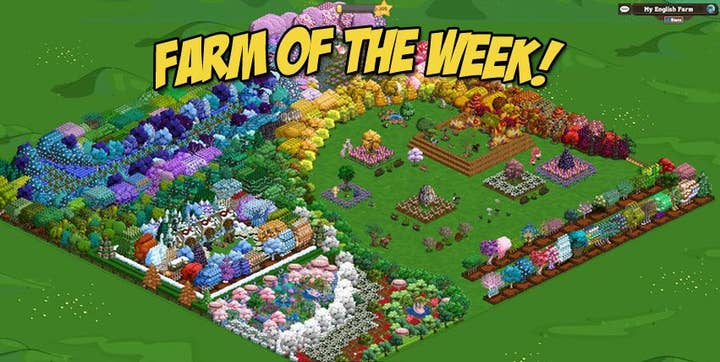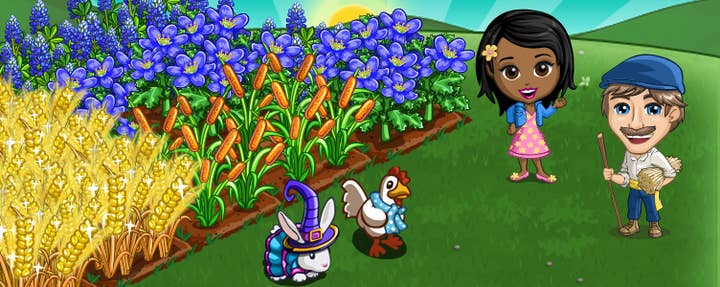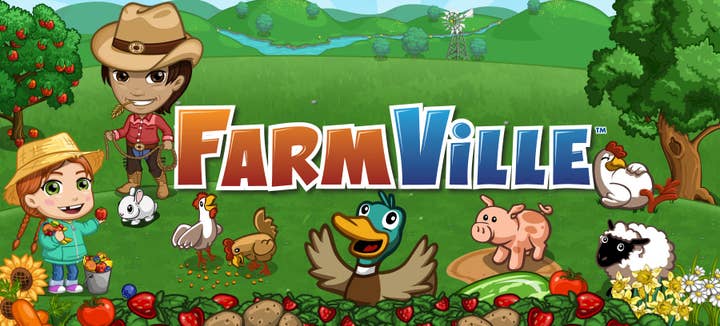Mass market, mystery boxes and metric-driven design: The legacy of FarmVille
With the original FarmVille shutting down after 11 years, we explore the impact the hit social game had on the industry
FarmVille is one of the most influential games of all time.
Debuting on Facebook in 2009, the browser-based casual farming sim went on to change the course of the industry in various ways so it's perhaps surprising to learn of its humble origins.
As Zynga's former senior vice president Mark Skaggs, who led the original FarmVille team, recalls, they had been asked to create a strategy title for Facebook following their success with Mafia Wars. But he soon realised it wouldn't get off the ground.
"I know some people would want an Age of Empires but running in Flash on Facebook," he says. "And that wasn't going to happen."
A peer suggested a farming game instead, and Skaggs and his small team believed that would be simple enough to produce a game within a month. It actually took six weeks.

"It was a very fast and loose project because for some of us who had been in the console space, it was a very simple game to do," he says. "So we cranked it out... Completely unaware of how big it would become."
In the office, the FarmVille team used a whiteboard to place bets on how many day one active users they would get, with guesses ranging from 2,000 to 9,000.
"We thought that last one was insane -- 9,000 people weren't going to play a farming game," Skaggs recalls. "We woke up the next morning and it was already at 12,000. By the end of the day it was 25,000."
FarmVille launched on Friday, June 19, 2009. By Sunday, it had reached 100,000 players. Monday, 500,000. Tuesday, one million.
Skaggs and his team had struck gold. FarmVille was by no means the first of its type, but it had somehow tapped into something wide audience wanted, a demand that developers the world over didn't even know existed.
The co-creator partly attributes this to timing. In the summer of 2009, the world was recovering from the stock market crash of 2008. People were low on disposable income, and here was this free entertainment they could access just with a computer browser.
That last point cannot be emphasised enough. While the Nintendo DS and Wii had launched in 2004 and 2006 respectively, reaching wider audiences than most consoles before them, their triple-figure price point was still a barrier to entry for many. Similarly, the iOS App Store had launched the year before, but smartphones were prohibitively expensive and app developers had yet to push free-to-play experiences on the scale they do today.
"We'd tapped into this thing that we couldn't quite imagine how big it was"
Mark Skaggs, FarmVille developer
So to have a casual game that could be accessed on a device most people already used removed all friction, and Skaggs and his team found themselves racing to keep up with the growth.
"It was a little scary but we loved seeing reports of people setting alarms to get up to harvest their crops," he says. "There were pictures of people carrying their laptop into a bar so they could harvest their strawberries."
Zynga conducted player interviews to find out why FarmVille was so popular. The first question was how long they had been a gamer, and yet users who admitted to playing FarmVille every day said this label did not apply to them.
"We were like: 'Wait a minute, there are people who are not identifying as gamers, who wouldn't buy a Wii, never bought a game console, who are now suddenly playing this,'" says Skaggs. "It was a big shock and surprise... We'd tapped into this thing that we couldn't quite imagine how big it was."
Will Luton, founder of game design and product management agency Department of Play, points to FarmVille as the first game that captured the attention of the mass market, at least in the West.
"It's kind of hard to overstate the impact of FarmVille as it is so integral to the explosion of social and free-to-play gaming," he says. "For many years before FarmVille, video games really meant PC and console games for men aged 12-40.
"While it became popular to be snobby about FarmVille, in the first few months everyone was playing: from hardcore shooter players all the way to Karen in accounts. It was a big wakeup to the Western industry to look beyond traditional business models, platforms and audiences. But very few really understood how it was working."

Nicholas Lovell, director of consultancy Gamesbrief, believes the world will look back on FarmVille as "a turning point in the whole of the games industry."
"In the game shutting down, we lose an important part of history. If you played every hit game of every year up to FarmVille, you'd notice this profound leap"
Will Luton, Department of Play
"It was the game that punctured the idea that games were for gamers, and allowed the industry to break out of the tribal, controlling mindset that still dominates in certain subsets of the community," he says.
Lovell recalls the moment FarmVille won Best New Social/Online Game at the GDC Awards in 2010 -- the revelation was booed and heckled, with other developers shouting "FarmVille is not a game." But its success "started the end of that elitist snobbery in video games."
"It showed that millions of people -- 80 million every day on FarmVille -- enjoyed games where they didn't need hundreds of dollars of special equipment to play, where they didn't need to learn new skills like mastering a controller or installing software or worrying about drivers," he continues.
"These 'ordinary people' could play video games in the same way that they could do a daily crossword in the newspaper or watch a soap opera. And, because it was part of Facebook, they could do it in a lightly-social way, with an awareness that their friends were playing too."
Game and extended reality consultant Tadhg Kelly adds that FarmVille's rapid growth also turned the heads of investors: "For a few years, VCs and similar folk were amenable to investing in game companies -- that had a large impact on the industry, and further on into mobile. That in turn had a massive effect on the shape of the industry leading to the weird world we now live in where the biggest gaming markets are not those that excite traditional gamers."
Perhaps the biggest market FarmVille influenced was free-to-play. In 2009, it was the very literal embodiment of that model, in that there were no monetisation mechanics at all.
"We just didn't have time," says Skaggs. "As soon as it became clear the game was a hit, [Zynga founder] Mark Pincus was like: 'Hey, we need to put in monetisation.'"
The team decided to sell coins, then added more and more items and features that players could spend those coins on. It established a system where transactions are once-removed from real currency, so it's not immediately clear how much real-world value the in-game item holds -- something that has become the bedrock of the free-to-play market.
It was a new experience for Skaggs. Prior to his time at Zynga, he had served as executive producer on titles like Command & Conquer: Red Alert 2, and as such was used to a model where the games he made were shipped to retail with the hope that people would buy them. But as the FarmVille team grew from ten people to 100 in a short space of time, there were suddenly bills to pay to keep this free game running.
However, he observes that how FarmVille was monetised is different to most free-to-play games of today: "We started with a great experience and then layered in monetisation over time. We knew if we added value players wanted, they would buy it. But [in 2009] this was new, it was fresh. Today, the market is so much more competitive, especially on mobile, and teams need to successfully integrate that monetisation very early on in the process.
"The ones I like let you enjoy the game first and then decide if you want to pay to continue enjoying it, but there are some games that hit you with monetisation within the first minute. It comes down to personal philosophy. Good long-term games make you feel good while you're playing them."

FarmVille's mechanics were also adopted by other casual and social games developers, and are today established as staples of free-to-play. Real-time loops where players have to wait for tasks to complete before progressing, collecting items and decorating a custom space, inviting friends to help you complete quests, exchanging items and boosters -- Skaggs acknowledges that FarmVille didn't invent any of the mechanics in the original version of the game but did bring them "to the masses."

"Every day, I look at games and I'm like 'Oh, here's the evolution of this mechanic and there's the evolution of that one,'" he says. "Even stuff like daily return bonuses -- come back and you get stuff -- all of that goes way back to 2009 and FarmVille."
One mechanic in particular has gone on to have a legacy of its own: mystery boxes. While Skaggs has previously used them in Mafia Wars, the concept was adapted for FarmVille, granting players a random reward. The gacha-inspired mechanic is perhaps better known today as the loot box, and has been under increased scrutiny in recent years as governments around the world debate whether this constitutes gambling -- especially when connected to monetisation.
Skaggs recognises the evolution from FarmVille's mystery boxes, but adds there was a crucial difference in how his game handled this versus the more insidious methodology behind it in more modern titles.
"We didn't have all these odds tables and calculations everyone uses now," he explains. "I don't think anyone even did the original maths on how many mystery box things happen, I think it was just like spinning the wheel.
"But right now, it's evolved. And some countries now have laws about how you have to publish the odds -- when it's taken to its extreme, like anything, a strength that's overused becomes a weakness, it becomes a problem. It creates a situation where it taps into people's psychological compulsions and makes them spend more money.
"FarmVille was one of the titles that enabled us to grow from an audience of a few tens of millions of gamers to nearer a billion. That is some legacy"
Nicholas Lovell, Gamesbrief
"Is that a bad thing? There are casinos all over the world where people go in and play and have fun. I think it becomes a problem when there's the overpromising, where it suggests that if you spend again, maybe you'll get that gold thing that only one in a million people get. When it becomes dishonest like that, that's the problem."
While there was less of a data-driven ethos behind its monetisation, Skaggs says this mentality certainly increased when it came to post-launch game design. Zynga had already dabbled in this on Mafia Wars, YoVille and other titles, but suddenly metrics were as prominent a part of the team's day-to-day as creativity.
Game consultant Tadhg Kelly points to FarmVille as the moment behavioral analytics really became integrated into game design practices. In turn, this "clearly genericised design" and has moved much of the industry "into ethically grayer spaces."
Luton observes that other developers quickly broke down the success of FarmVille and tried to replicate it in their own title. This changed the way games were being developed; it was no longer just about the core experience, but also who was playing and how they played.
"A new design ideology began which incorporated traditional game design alongside disparate fields like behavioural economics, business management and data analysis," he says. "The industry started to have a new language to talk about games as designers began to discuss core loops, sessioning, pinch points, return triggers, ARPMAU and the like. It sort of academialised and challenged a lot of the received wisdom and art of game design, which push games forward even outside of the free-to-play and social space.
FarmVille itself has been described as a clone, likely referring to the Chinese-developed 2008 title Happy Farm, and Luton says enough clones followed that people soon began talking about farming as a genre.
"Hay Day was ostensibly a tweaked version of FarmVille and Supercell's first real success," he observes.

Yet for all its impact on the games industry, FarmVille's days are numbered. Zynga announced earlier this year that the original game will be shut down on December 31, 2020. While it doesn't leave a void -- there are countless FarmVille-like games on mobile, not to mention Zynga's own sequels -- it does have a more detrimental effect on an industry that has a terrible track record for preserving its own past.
"FarmVille's historical importance is profound," says Luton. "In the game shutting down we lose an important part of history, and the connections between games and design ideas are lost to future generations. If you played every hit game of every year up to FarmVille you'd notice this profound leap -- the otherness and non-conforming nature of it.
"So I hope that Zynga have ways of preserving the code of not just the final iteration, but all iterations, so that next generations of game designers can learn not just how to build time-based core loops but how ignoring the rules of the current zeitgeist can lead to unexpected success."
Skaggs, meanwhile, recognises why the original game is being retired. FarmVille was written in Flash, which has been losing support over the years -- you even need a special browser plug-in to run the original game now -- so its shutdown is perhaps inevitable. In fact, technology had advanced so much by the time his next title, CityVille, launched that Skaggs describes it as "almost like a console transition."
And, inevitably, the audience has moved towards mobile over the years, smartphones being more ubiquitous and convenient than lugging a laptop to a bar so you can harvest strawberries.
"I'm 100% sure if someone had the time, energy and money, they could rewrite the whole thing maybe in HTML5 and keep it going," he says.
"Part of being in the console and PC business for such a long time, there's a lot of games I've made that don't exist anymore other than as a package on my shelf. It's bittersweet, it's nostalgic, and it's good getting to relive these moments.
"FarmVille lasted 11 years. Not the longest for a game I've had -- C&C Generals has an active mod community, people are still playing Red Alert 2. But this one's a little bit special to me because of the crazy ride that it was."
Lovell concludes: "FarmVille showed developers, investors and most importantly players that there was a world of games that could appeal to anyone. That you didn't have to be a 'gamer' to play games. That games are a fun, enjoyable, accessible pastime for everyone, no matter their age, gender or technical proficiency.
"But more broadly, FarmVille was one of the titles that enabled us to grow from an audience of a few tens of millions of gamers to nearer a billion. That is some legacy."

